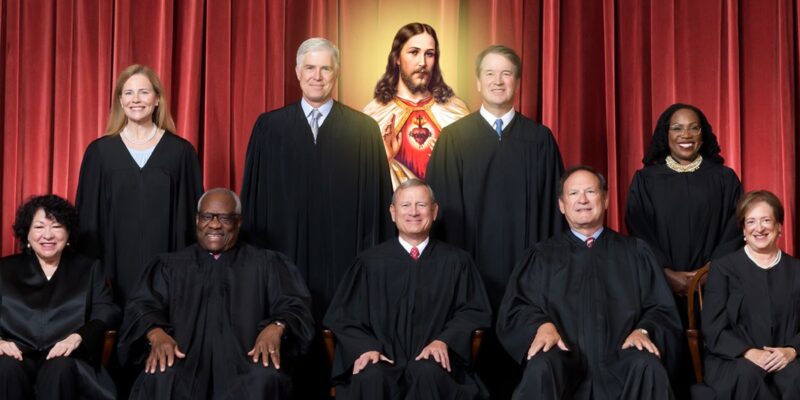
During the contentious confirmation hearings of Supreme Court Justice Brett Kavanaugh in 2018, a self-appointed Christian apostle named Dutch Sheets issued an urgent call for prayer on his website. Sheets is a leader in an enigmatic charismatic movement known as the New Apostolic Reformation, which calls the faithful to fight a spiritual war for Christian control of the United States government. He urged his readers to ask God to grant them “a majority of Justices who are Constitutionalists, literalists (meaning they believe the Constitution is to be taken literally, exactly as it is written) and who are pro-life.” He added, “Let’s also boldly ask Him for another vacancy on the Court soon—I feel strongly in my spirit another is coming quickly. We should be offensive in our prayers, not just defensive and reactionary.”
Apostles, prayer offensives, spiritual messages—by most standards, Sheets’ approach to politics would be considered highly eccentric, to put it mildly. Yet among adherents of the New Apostolic Reformation, the idea that God was involved in anointing justices had already gained traction. Another influential apostle, a Texas-based, self-described “strategist, futurist, and compelling communicator” named Lance Wallnau, declared in a 2018 broadcast that the accusations of rape against Kavanaugh were a “spiritual attack.” The previous year in a YouTube video, apostle and Trump campaign adviser Frank Amedia recounted how, “at 3:30 in the morning, the Lord showed me a broom going up and down the pillars of the Supreme Court building.” The message was clear: God wanted to sweep out the old justices—especially the liberal ones—to make room for new Christian ones.
In the midst of the chaos surrounding Justice Kavanaugh’s nomination, the apostles’ visions of a Christian Supreme Court didn’t get much mainstream attention—until they did. Over the last few years, the Christian nationalist movement has gained political prominence, as its influential members have sought to make the case for an explicitly Christian society in public schools, social policy, and even in Congress, led by the ultraconservative and devout House Speaker Mike Johnson.
Against this cultural backdrop, calls for a godly Supreme Court have moved beyond the echo chamber of the far-right fringe. Last month, the New York Times broke a series of stories about flags displayed at the homes of US Supreme Court Justice Samuel Alito. Outside of Alito’s main residence was an upside-down American flag, a symbol associated with the effort to overturn the 2020 US presidential election. At his vacation home in New Jersey, the Times’ Jodi Kantor later reported, was an “Appeal to Heaven” flag showing a lone pine tree, an old icon that had been revived by none other than Dutch Sheets. (As it turned out, the flag belonged to Alito’s wife, Martha-Ann.) Leonard Leo, the deep-pocketed conservative kingmaker who has extended his largesse to several Supreme Court justices and their families, has also flown the “Appeal to Heaven” flag outside his home in Maine, Rolling Stone recently reported.
Perhaps more troubling than the flags, though, is that the idea of promoting a Christian nation seems to be seeping into some of the justices’ legal arguments. Elliot Mincberg, an attorney and Supreme Court researcher at the progressive advocacy group People for the American Way, has documented ways in which some members of the Court espouse the popular evangelical belief that Christians are being persecuted and therefore must be defended. “The far-right majority of Court is very much in the same view as the New Apostolic Reformation folks about religion, about government,” he says. “And, frankly, about the hostility of government to religion.”
The far-right majority of Court is very much in the same view as the New Apostolic Reformation folks about religion, about government. And, frankly, about the hostility of government to religion.”
On June 3, a few days after I spoke to Mincberg, the annual Supreme Court Historical Society dinner took place, in which members of the Society have an opportunity to meet the justices socially over a meal. This was the occasion when Justice Alito said the quiet part out loud. Rolling Stone reported on a recording made by documentary filmmaker Lauren Windsor, who interviewed Alito. During a private conversation with him that she recorded, she said, “People in this country who believe in God have got to keep fighting…to return our country to a place of godliness.” Alito replied, “I agree with you.” He also told Windsor, “One side or the other is going to win. I don’t know. I mean, there can be a way of working—a way of living together peacefully, but it’s difficult, you know, because there are differences on fundamental things that really can’t be compromised.”
One common misconception about the New Apostolic Reformation is that it is a Protestant denomination, like Baptists or Presbyterians. When I first started researching this movement, I googled “New Apostolic Reformation church near me,” naively thinking that I could pop into a service and perhaps ask a pastor to explain the sect. What I quickly discovered, though, is that there is no single leader of the New Apostolic Reformation, no annual conference, nor any website with its statements of belief. Rather, the movement is vast and amorphous, a network of various individual prophets and apostles overseeing their own ministries and issuing prophetic declarations as they go along. It’s safe to say that many people who attend a church whose leaders dabble in the theology promoted by the New Apostolic Reformation have never heard of it.
The movement came out of the older and more well-known tradition of Pentecostalism, whose adherents believe that God grants some believers the ability to perform miracles and speak in tongues. The term “New Apostolic Reformation” was coined in the 1990s by an influential evangelical writer named C. Peter Wagner, though the term didn’t get much national attention until a few decades later.
In 2011, National Public Radio’s Terry Gross interviewed a scholar of religion about the movement and referred to Wagner as its “leading architect.” In a rebuttal piece for the Christian publisher Charismatic News, Wagner emphasized that he was not the movement’s leader—because it had none. Rather, he said, it was a coming together of several sects that shared a belief that God appointed apostles and prophets. He noted that it was the duty of Christians to engage in spiritual warfare to establish “kingdom-minded people in every one of the Seven Mountains: Religion, Family, Education, Government, Media, Arts & Entertainment, and Business so that they can use their influence to create an environment in which the blessings and prosperity of the Kingdom of God can permeate all areas of society.”
This doctrine—sometimes known as the Seven-Mountain Mandate—is a central tenet in the New Apostolic Reformation. Many of the most prominent apostles today—Texas business consultant Lance Wallnau, for instance, as well as Korean-American Pastor Ché Ahn of Harvest Rock Church in Pasadena, California—regularly preach about its importance. Today, estimates of the number of people whose churches are influenced by the New Apostolic Reformation vary widely, from 3 million to 33 million. Because of the movement’s laser focus on starting a spiritual war to Christianize America, the Southern Poverty Law Center recently called the New Apostolic Reformation “the greatest threat to US democracy that you have never heard of.”
One other distinguishing feature of the New Apostolic Reformation is the belief that God is still communicating directly with people through modern-day prophets, who preach about the messages directly from God that they receive, often in dreams. Since 2016, many of the most publicized prophesies have concerned former president Trump, whom they see as chosen by God. The “Appeal to Heaven” flag that Dutch Sheets popularized was flown by many attendees at the “Stop the Steal” rally that preceded the Capitol insurrection of January 6, 2021; a few months before, Sheets told his followers that the results of the presidential election were “going to be overturned and President Trump is going to be put back in office for four years.” In 2022, Sheets said that Trump had told him in a dream that he would be a “political martyr” because, he had said, loosely quoting the Bible, “‘God has put the tools in me to tear down, root up, and confront the system.’”
Peter Montgomery, research director at the People for the American Way’s watchdog publication Right Wing Watch, has also been tracking New Apostolic Reformation prophets’ fixation on the nation’s highest court. He has documented how prophets have encouraged their followers to ask God to remove all the left-leaning justices from the Supreme Court. In 2018, he attended an event at the Trump International Hotel in Washington, DC, during which Sheets and several other prophets fervently prayed for the remaking of the Supreme Court.
Cindy Jacobs—who wielded a souvenir gavel she had purchased at the Supreme Court gift shop—joined them. Jacobs, who is close with Sheets and runs a New Apostolic Reformation-aligned ministry in Texas called Generals International, announced at the meeting that God had advised her the time had come to “convene the courts of heaven.” In 2020, prophet Frank Amedia cheered the death of Supreme Court Justice Ruth Bader Ginsburg and suggested that his conversation with the Almighty may have had something to do with her passing. “I made a desperate appeal to the Lord to rescue us, our nation, the church, and to hear the cry of the blood of the 60 million murdered children; and to answer quickly and NOW for HIS own name’s sake,” he wrote on Facebook. “In less than one hour, the announcement of Ginsburg’s passing came out.”
“I made a desperate appeal to the Lord to rescue us, our nation, the church, and to hear the cry of the blood of the 60 million murdered children; and to answer quickly and NOW for HIS own name’s sake. In less than one hour, the announcement of Ginsburg’s passing came out.”
Around the same time, Montgomery reported, just before President Trump appointed Justice Amy Coney Barrett, two more prophets affiliated with the New Apostolic Reformation, Lou Engle and Matt Lockett, had said that their dreams included prophetic signs about Amy Coney Barrett, who was then a law professor at Notre Dame. “Remember the name Amy Coney Barrett!” Engle urged his followers. “Yes, we begin to decree it from the throne room of God!” Another prominent prophet and Barrett fan was an Alabama lawyer named Phillip Jauregui, who helms an organization dedicated to supporting Christian judges called Judicial Action Group. Jauregui had been hoping that Barrett would be appointed since 2018. Unlike some other prophets who strongly supported Kavanaugh, Jauregui was so certain Barrett was God’s chosen candidate that he had declared Kavanaugh a “usurper.”
The apostles’ embrace of Barrett was especially noteworthy because while adherents of the New Apostolic Reformation are protestant, Barrett, like the majority of the Supreme Court justices, including Kavanaugh, is Catholic. Although evangelical protestants and Catholics have opposing theological beliefs, Barrett’s faith community, the controversial People of Praise, may have been more palatable to New Apostolic Reformation believers because of its distinctly charismatic flavor—they also believe that God gives people spiritual gifts, such as the ability to speak in tongues. Moreover, says André Gagné, a theology professor who studies the New Apostolic Reformation at Montreal’s Concordia University, Catholics and evangelicals appear to be increasingly “putting aside theological differences in order to bond together so that they can push back against the creeping, secular humanism that is happening in America.”
In particular, for the New Apostolic Reformation prophets, Barrett was a foot soldier in one of their most important holy wars and one in which Catholics and evangelicals have long found common cause: abortion. “She was on record of what mattered most to them,” Right Wing Watch’s Montgomery said of Barrett. “She was on record having signed statements that life begins at conception. And that was their key to overturning Roe.”
Indeed, in 2021 Judicial Action Group filed an amicus brief in Dobbs v. Jackson Women’s Health. Jauregui said that God had told him that though the justices had sinned 50 years ago with the passage of Roe, the Lord was “calling the Supreme Court back.” The following year, when the Supreme Court overturned Roe, the American Family Association, a nonprofit that describes itself as “dedicated to advancing biblical, family values in society and government.” It has declared June 26, the day that the Supreme Court legalized gay marriage “our 9/11,” claiming in a press release that Jauregui had been partially responsible. “You will hear the never-told account of how God used…AFA Action team member, Phillip Jauregui, to ensure the nomination of Amy Coney Barrett, over far less qualified candidates, as Justice to the US Supreme Court.”
“The greatest predictor of [judicial nominees’] faithful and constitutional performance on the bench is their ‘worldview’ or ‘Christian faith.’”
Last year, the American Family Association launched a new initiative called the Center for Judicial Renewal, which, like the Judicial Action Group, advocates for the appointment of like-minded judges throughout the system. (Because they are 501(c)4 social welfare organizations, neither of the groups has to disclose its donors.) Jauregui, who also serves as the director of the new group, stated on the website that “the greatest predictor of [judicial nominees’] faithful and constitutional performance on the bench is their ‘worldview’ or ‘Christian faith.’”
Jauregui could find much to like in the creeping religiosity of some of the justices’ recent writings. The first high-profile case of this kind in recent history came in 2014, when the Supreme Court’s Hobby Lobby decision allowed employers to decline to pay for employees’ birth control insurance because of their religious convictions. In his decision, Alito cited a 1935 handbook for Jesuits on moral theology. Since then, says People for the American Way’s Mincberg, the Supreme Court has handed religious groups several victories. He pointed to the 2019 case American Legion v. American Humanist Association. In a seven-to-two decision, the Court ruled in favor of the American Legion, which had erected and maintained a 40-foot cross on public land in Maryland. The ruling overturned that of the 4th Circuit, which had concluded that the cross “either places Christianity above other faiths, views being American and Christian as one in the same, or both.” In the Opinion of the Court, authored by Justice Alito, he wrote that taking down the cross would be “aggressively hostile to religion.”
Then there was the 2022 opinion on the Kennedy v. Bremerton case about a public high school football coach who lost his job after he prayed during a game. The coach challenged his dismissal, and by the time it reached the Supreme Court, the case became a religious freedom challenge. In the six-to-three decision, Justice Neil Gorsuch wrote that the coach’s prayers had been unobtrusive. He went on to unilaterally declare that the court had “long ago abandoned” a decades-old precedent that established that government employees can’t advance a particular religious ideology. In her dissent, where she was joined by Justices Stephen Breyer and Elena Kagan, Justice Sonia Sotomayor wrote the coach’s prayers were far from being “private and quiet” as Justice Gorsuch argued, and the decision “ignores the severe disruption to school events caused by Kennedy’s conduct.” She worried that the case could set a dangerous precedent in failing to protect “the separation between church and state, eroding the protections for religious liberty for all.”
That same year, when the Supreme Court overturned Roe v. Wade, in his decision Alito described abortion as a “profound moral issue.” Supreme Court reporter Linda Greenhouse noted in a New York Times op-ed, “The assumption that the moral gravity of abortion is singular and self-evident…gives away more than members of the majority, all five of whom were raised in the Catholic Church, may have intended.”
This past February, Alito issued an unusual individual statement after the court declined to take up a case filed on behalf of people who had been removed from a jury because of their belief that gay marriage was wrong. Alito wrote that he worried “Americans who do not hide their adherence to traditional religious beliefs about homosexual conduct will be ‘labeled as bigots and treated as such’ by the government.” The perception that Christians are being persecuted by the government is a potent rallying cry of the Christian nationalist movement, says Mincberg. “There’s very little question that [Christian nationalist] views are very much reflected in where this Supreme Court majority is on religion and church and state.”
“There’s very little question that [Christian nationalist] views are very much reflected in where this Supreme Court majority is on religion and church and state.”
In March, Jauregui instructed his followers to “[p]ray that the Lord would be glorified through the remainder of the Supreme Court session and accompanying decisions.” Some Christian groups are doing more than praying; they’re filing amicus briefs— documents submitted by people outside of a given case who believe their expertise may help the justices in their deliberations. The briefs can be influential. In a landmark ruling last year on affirmative action in higher education, for example, legal scholars noted that a brief from the US military strongly influenced the justices to exempt military academies from the new rules. Previously, those who wanted to file an amicus brief with the Supreme Court had to obtain permission from lawyers on either side of the case in question. That requirement was dropped in early 2023; now anyone can file, as long as their lawyer is a member of the US Supreme Court bar.
The amicus floodgates then opened, and included in the onslaught of briefs for the current roster of cases were some whose authors had explicitly Christian Nationalist ties. Condemned USA submitted a brief in support of President Trump in the immunity case. Describing its mission as “preserving your rights and freedoms by defending against a weaponized system of justice for all American citizens and future generations,” it is led by January 6th insurrectionist Treniss Evans, who has appeared at live and virtual events with New Apostolic Reformation prophets. Another brief in support of Trump came from the Christian Family Coalition, a Florida nonprofit that says it is “intensely involved in the political process to secure its goals in the public interest.” Among its current projects is advocating for chaplains in Florida’s public schools.
One of the strangest amicus briefs I read was from the January 6th insurrectionist case. It argues that the Court of Appeals assertion that insurrectionist Nate Fischer acted “corruptly” wasn’t biblically sound. The brief was submitted by a lawyer named Gerald Thompson on behalf of a group called the Lonang Institute, which says it applies “the ‘Laws of Nature and Nature’s God’ to contemporary legal disputes.” On the Lonang Institute website, Thompson has published his ramblings about apocalyptic visions of the world’s end and the arrival of Jesus Christ who will separate the saved from the damned. He touches on climate change (“Saving the planet is out of the hands of man and in the hands of God. He will deal with it as He wishes.”) and predicts medical advances (“special water and these special leaves” that “will heal the people of the nations of all their illnesses and diseases”). He insists that Muslims “expressly hate and want to kill all Christians and Jews as infidels,” and he declares that Jews will eventually accept Jesus as their lord and savior. In response to a request for comment from Mother Jones, a Lonang Institute spokesperson wrote, “Just because we permit something to be posted, doesn’t mean we agree with everything said in it.”
One of the most important reproductive rights cases on the docket this year—FDA v. Alliance for Hippocratic Medicine—will determine how people can obtain the abortion medication mifepristone. One amicus brief urging the court to limit access to mifepristone came from the Family Policy Alliance, a coalition of statewide ministries that describes itself as “a Christ-centered organization seeking to honor God in public policy.” A similar brief was submitted on behalf of the Institute for Faith and Family, a North Carolina nonprofit dedicated to “promoting public policies…that will strengthen and preserve traditional Judeo-Christian, conservative family values.” One of the attorneys who filed the brief was a North Carolina Christian ventriloquist and attorney named Deborah Dewart, author of a book called Death of a Christian Nation.
Correction, June 11: An earlier version of this article misstated the origin of the Alitos’ “Appeal to Heaven” flag. The error has been corrected.















